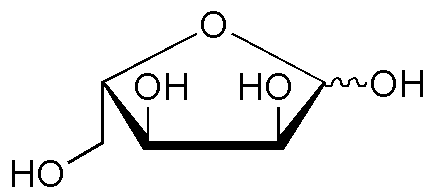L-Ribose is widely utilized in research focused on:
- Energy Supplementation: Commonly used by athletes and individuals with chronic fatigue, L-Ribose helps enhance energy production in cells, making it beneficial for improving exercise performance and recovery.
- Cardiovascular Health: It supports heart function by promoting ATP (adenosine triphosphate) production, which is crucial for heart muscle energy, thus aiding patients with heart disease or ischemia.
- Diabetes Management: Research indicates that L-Ribose may help regulate blood sugar levels, offering potential benefits for individuals managing diabetes by improving insulin sensitivity.
- Muscle Recovery: Used in post-exercise recovery supplements, it aids in reducing muscle soreness and fatigue, making it popular among fitness enthusiasts and bodybuilders.
- Research in Genetics: L-Ribose plays a role in the synthesis of nucleotides, which are essential for DNA and RNA production, making it valuable in genetic research and biotechnology applications.
General Information
Properties
Safety and Regulations
Applications
L-Ribose is widely utilized in research focused on:
- Energy Supplementation: Commonly used by athletes and individuals with chronic fatigue, L-Ribose helps enhance energy production in cells, making it beneficial for improving exercise performance and recovery.
- Cardiovascular Health: It supports heart function by promoting ATP (adenosine triphosphate) production, which is crucial for heart muscle energy, thus aiding patients with heart disease or ischemia.
- Diabetes Management: Research indicates that L-Ribose may help regulate blood sugar levels, offering potential benefits for individuals managing diabetes by improving insulin sensitivity.
- Muscle Recovery: Used in post-exercise recovery supplements, it aids in reducing muscle soreness and fatigue, making it popular among fitness enthusiasts and bodybuilders.
- Research in Genetics: L-Ribose plays a role in the synthesis of nucleotides, which are essential for DNA and RNA production, making it valuable in genetic research and biotechnology applications.
Documents
Safety Data Sheets (SDS)
The SDS provides comprehensive safety information on handling, storage, and disposal of the product.
Product Specification (PS)
The PS provides a comprehensive breakdown of the product’s properties, including chemical composition, physical state, purity, and storage requirements. It also details acceptable quality ranges and the product's intended applications.
Certificates of Analysis (COA)
Search for Certificates of Analysis (COA) by entering the products Lot Number. Lot and Batch Numbers can be found on a product’s label following the words ‘Lot’ or ‘Batch’.
Numéro de catalogue
Numéro de lot/série
Certificates Of Origin (COO)
This COO confirms the country where the product was manufactured, and also details the materials and components used in it and whether it is derived from natural, synthetic, or other specific sources. This certificate may be required for customs, trade, and regulatory compliance.
Numéro de catalogue
Numéro de lot/série
Safety Data Sheets (SDS)
The SDS provides comprehensive safety information on handling, storage, and disposal of the product.
DownloadProduct Specification (PS)
The PS provides a comprehensive breakdown of the product’s properties, including chemical composition, physical state, purity, and storage requirements. It also details acceptable quality ranges and the product's intended applications.
DownloadCertificates of Analysis (COA)
Search for Certificates of Analysis (COA) by entering the products Lot Number. Lot and Batch Numbers can be found on a product’s label following the words ‘Lot’ or ‘Batch’.
Numéro de catalogue
Numéro de lot/série
Certificates Of Origin (COO)
This COO confirms the country where the product was manufactured, and also details the materials and components used in it and whether it is derived from natural, synthetic, or other specific sources. This certificate may be required for customs, trade, and regulatory compliance.


